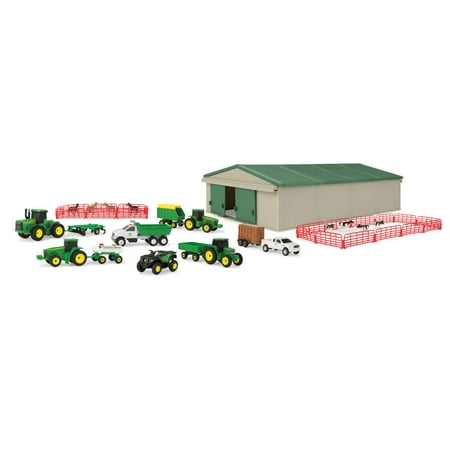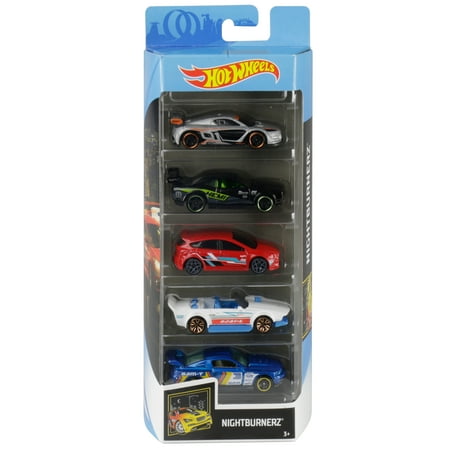Matchbox Adventure 20 Car Pack
Roll out an instant collection with this 20-pack of Matchbox cars and trucks. The perfect gift for kids or collectors, it features a great variety of colors, silhouettes and licenses of 1:64 scale Matchbox cars with highly realistic details, authentic decos and real rolling wheels. Additionally there is a small Matchbox poster included! Whether they’re cruising through the city, racing to the rescue or driving full-throttle toward an adventure, these cars will deliver hours of imaginative play. Includes a variety of 20 Matchbox metal vehicles. Not for use with some Matchbox sets.Colors and decorations may vary.




Matchbox Adventure 20 Car Pack:Age Range: 3 Years and UpStart an instant collection of original and licensed Matchbox die-cast vehicles!Fantastic variety pack of 20 Matchbox metal vehicles!Each vehicle is in 1:64 scale with realistic details and authentic decosMakes a great gift for kids and collectors!Added bonus– small Matchbox poster!
Twenty or 20 may refer to:
- 20 (number), the natural number following 19 and preceding 21
- one of the years 20 BC, AD 20, 1920, 2020
An adventure is an exciting experience or undertaking that is typically bold, sometimes risky. Adventures may be activities with danger such as traveling, exploring, skydiving, mountain climbing, scuba diving, river rafting, or other extreme sports. Adventures are often undertaken to create psychological arousal or in order to achieve a greater goal, such as the pursuit of knowledge that can only be obtained by such activities.
A car, or an automobile, is a motor vehicle with wheels. Most definitions of cars state that they run primarily on roads, seat one to eight people, have four wheels, and mainly transport people over cargo. There are around one billion cars in use worldwide.
The French inventor Nicolas-Joseph Cugnot built the first steam-powered road vehicle in 1769, while the Swiss inventor François Isaac de Rivaz designed and constructed the first internal combustion-powered automobile in 1808. The modern car—a practical, marketable automobile for everyday use—was invented in 1886, when the German inventor Carl Benz patented his Benz Patent-Motorwagen. Commercial cars became widely available during the 20th century. The 1901 Oldsmobile Curved Dash and the 1908 Ford Model T, both American cars, are widely considered the first mass-produced and mass-affordable cars, respectively. Cars were rapidly adopted in the US, where they replaced horse-drawn carriages. In Europe and other parts of the world, demand for automobiles did not increase until after World War II. In the 21st century, car usage is still increasing rapidly, especially in China, India, and other newly industrialised countries.
Cars have controls for driving, parking, passenger comfort, and a variety of lamps. Over the decades, additional features and controls have been added to vehicles, making them progressively more complex. These include rear-reversing cameras, air conditioning, navigation systems, and in-car entertainment. Most cars in use in the early 2020s are propelled by an internal combustion engine, fueled by the combustion of fossil fuels. Electric cars, which were invented early in the history of the car, became commercially available in the 2000s and are predicted to cost less to buy than petrol-driven cars before 2025. The transition from fossil fuel-powered cars to electric cars features prominently in most climate change mitigation scenarios, such as Project Drawdown's 100 actionable solutions for climate change.
There are costs and benefits to car use. The costs to the individual include acquiring the vehicle, interest payments (if the car is financed), repairs and maintenance, fuel, depreciation, driving time, parking fees, taxes, and insurance. The costs to society include maintaining roads, land-use, road congestion, air pollution, noise pollution, public health, and disposing of the vehicle at the end of its life. Traffic collisions are the largest cause of injury-related deaths worldwide. Personal benefits include on-demand transportation, mobility, independence, and convenience. Societal benefits include economic benefits, such as job and wealth creation from the automotive industry, transportation provision, societal well-being from leisure and travel opportunities. People's ability to move flexibly from place to place has far-reaching implications for the nature of societies.
A matchbox is a container or case for matches, made of cardboard, thin wood, or metal, generally in the form of a box with a separate drawer sliding inside the cover. Matchboxes generally measure 5 x 3.5 x 1.5 cm, and commonly have coarse striking surfaces on the edges for lighting the matches. Cylindrical matchboxes with a round cover on one end are also available. For many applications matchbooks have replaced matchboxes.





Reviews
There are no reviews yet.